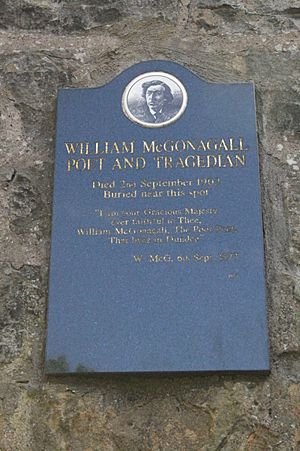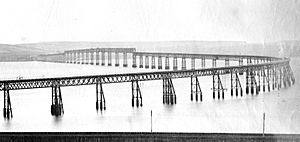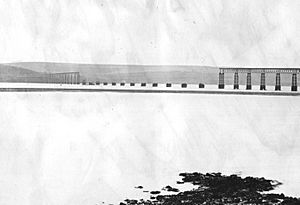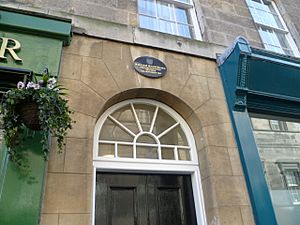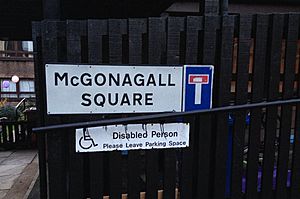William McGonagall facts for kids
Quick facts for kids
William Topaz McGonagall
|
|
|---|---|
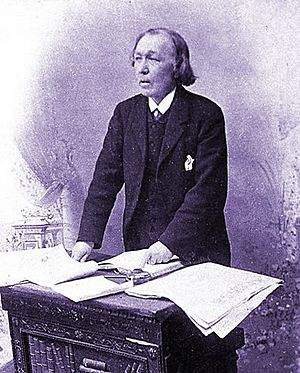 |
|
| Born | March 1825 Either Ireland or Edinburgh, Scotland |
| Died | 29 September 1902 (aged 77) Greyfriars Parish, Edinburgh |
| Occupation | Weaver, actor, poet |
| Language | English |
| Genre | Poetry |
| Spouse | Jean King |
| Children | 7 |
| Signature | |
William Topaz McGonagall (born March 1825 – died 29 September 1902) was a Scottish poet with Irish family roots. He became famous for his very unusual poetry style. Many people thought his poems were not very good, but he didn't seem to mind what others thought.
He wrote about 200 poems. Some of his most well-known ones are "The Tay Bridge Disaster" and "The Famous Tay Whale". These poems are often called some of the worst in English literature. However, people in Scotland loved to hear him read his poems aloud. Many found his performances very funny, like a comedy show. Even today, collections of his poems are still popular.
McGonagall is often joked about as the worst poet in British history. People mainly criticized his poems because he didn't seem to understand things like metaphor (comparing two unlike things) or proper scansion (the rhythm of poetry). He mostly thought poetry just needed to rhyme. His fame comes from how funny these mistakes made his work seem. Experts say his strange rhythms, simple words, and odd descriptions make his poems very funny, even if he didn't mean them to be. His poems were like old songs or stories written about big events and tragedies. Before radio or TV, these poems were a way to share important news with people.
Contents
Early Life and Beginnings
William McGonagall's parents, Charles and Margaret, were from Ireland. His family name, McGonagall, comes from an old Irish name. William often said he was born in Edinburgh, Scotland, in either 1825 or 1830. But records show he was likely born in "Ireland," like his parents. One writer, Norman Watson, thinks McGonagall might have changed his birthplace. This would have helped him get better support under Scottish laws than if he was born in Ireland. Most records suggest 1825 is his true birth year.
His family moved a lot to find work, possibly living in Glasgow and on South Ronaldsay before settling in Dundee around 1840. In Dundee, William became an apprentice to follow his father's job as a handloom weaver. This meant he stopped his formal schooling. But McGonagall taught himself by reading many books, especially cheap copies of Shakespeare's plays.
On 11 July 1846, he married Jean King, who also worked in a mill. They had five sons and two daughters. Even though new machines were making weavers less needed, McGonagall seemed to do well. There was still a need for skilled weavers to do complex tasks.
While working, McGonagall would entertain his co-workers by reciting parts of Shakespeare's plays. Once, his friends paid a theatre owner to let him act in a play called Macbeth. McGonagall believed the actor playing Macduff was jealous of him. So, he refused to die at the end of the play! Because of this performance, a book called The Book of Heroic Failures gave him the title of the "worst Macbeth" and "worst British poet."
Becoming a Poet
A big change happened in McGonagall's life in June 1877. It was getting harder to find work as a weaver. At this time, he suddenly felt inspired to write poetry.
He wrote his first poem, "An Address to the Rev. George Gilfillan". This poem already showed the unique style that would be in all his later work. Gilfillan, who was a preacher and sometimes wrote poetry, even said admiringly, "Shakespeare never wrote anything like this."
McGonagall believed that to be a successful poet, he needed a patron (someone important to support him). So, he wrote to Queen Victoria. He received a letter back from a royal helper, thanking him for his interest. McGonagall thought this letter meant the Queen praised his work. Later, in 1879, someone mocked his poetry, saying it was very bad. McGonagall proudly told him that "it was so very bad that Her Majesty had thanked McGonagall for what the Chief Templar had condemned."
This letter made McGonagall very confident in his "poetic abilities." He thought his fame would grow if he performed for the Queen in person. In July 1878, he walked about 60 miles (97 km) from Dundee to Balmoral, through mountains and a big thunderstorm, just to perform for Queen Victoria. When he arrived, he announced himself as "The Queen's Poet." The guards told him, "You're not the Queen's poet! Tennyson is the Queen's poet!" (Alfred, Lord Tennyson was the official poet for the Queen). McGonagall showed them the letter, but he was not allowed in and had to go home. He wasn't discouraged and kept writing poems. He told newspapers about his journey, which gave him a little bit of fame.
Throughout his life, McGonagall spoke out against too much drinking. He would go to pubs and bars to read poems and give speeches about the dangers of "strong drink." This was quite popular. But sometimes, pub owners didn't like it. Once, he was even hit with peas for reciting a poem about drinking.
In 1883, he celebrated the opening of University College, Dundee with a poem called "The Inauguration of University College Dundee." It starts like this:
Good people of Dundee, your voices raise,
And to Miss Baxter give great praise;
Rejoice and sing and dance with glee,
Because she has founded a college in Bonnie Dundee.
McGonagall often struggled with money. He earned money by selling his poems on the streets or reading them in halls, theatres, and pubs. When he was low on money, his friends would help him with donations. In 1880, he sailed to London to try and make his fortune, and in 1887, he went to New York. Both times, he came back without success.
He found a good way to earn money by performing his poetry at a local circus. He would read his poems while the audience was allowed to throw eggs, flour, fish, potatoes, and old bread at him. For this, he earned fifteen shillings a night. McGonagall seemed happy with this, but the shows became so wild that the city leaders had to ban them. McGonagall was very upset and wrote a poem called "Lines in Protest to the Dundee Magistrates":
Fellow citizens of Bonnie Dundee
Are ye aware how the magistrates have treated me?
Nay, do not stare or make a fuss
When I tell ye they have boycotted me from appearing in Royal Circus,
Which in my opinion is a great shame,
And a dishonour to the city's name (...)
McGonagall seemed unaware of what people really thought of his poems, even when they were throwing things at him. Some people think he might have been on the autism-Asperger's spectrum.
In 1890, McGonagall was in serious financial trouble. To help him, his friends paid for a collection of his poems to be published, called Poetic Gems. The money from this book helped McGonagall live for a while. By 1893, he was annoyed by how people treated him on the streets and wrote an angry poem threatening to leave Dundee. One newspaper joked that he would probably stay another year once he realized "that Dundee rhymes with 1893." After trying to write stories and ads for local businesses, in 1894, he and his wife had to move to Perth.
Soon after, he received a letter that seemed to be from representatives of King Thibaw Min of Burma. The letter said the King had made him a knight, calling him Topaz McGonagall, Grand Knight of the Holy Order of the White Elephant Burmah. Even though this was a clear hoax (a trick), McGonagall called himself "Sir William Topaz McGonagall, Knight of the White Elephant, Burmah" in his advertisements for the rest of his life.
In 1895, McGonagall and his wife moved to Edinburgh. Here, McGonagall became a "cult figure" and was very popular for a time. But it didn't last long. By 1900, he was poor again, and also old and sick. Even though he was too weak to walk the streets selling his poems, friends continued to donate money to help him.
He died without money in 1902, in a building that is now The Captain's Bar in Edinburgh. He was buried in an unmarked grave in Greyfriars Kirkyard in Edinburgh.
The Tay Bridge Disaster Poem
"The Tay Bridge Disaster" is one of McGonagall's most famous poems. It tells the story of what happened on the evening of 28 December 1879. During a very strong gale (storm), the Tay Rail Bridge near Dundee collapsed while a train was crossing it. The poem begins:
Beautiful Railway Bridge of the Silv'ry Tay!
Alas! I am very sorry to say
That ninety lives have been taken away
On the last Sabbath day of 1879,
Which will be remember'd for a very long time.
(Today, we know that about 75 people died in the disaster.)
The poem finishes with these lines:
I must now conclude my lay
By telling the world fearlessly without the least dismay
That your central girders would not have given way,
At least many sensible men do say,
Had they been supported on each side with buttresses,
At least many sensible men confesses,
For the stronger we our houses do build,
The less chance we have of being killed.
More than a year before the disaster, McGonagall had written a poem praising the Tay Bridge. In "The Railway Bridge of the Silvery Tay," he specifically hoped:
that God will protect all passengers
By night and by day,
And that no accident will befall them while crossing
The Bridge of the Silvery Tay,
For that would be most awful to be seen
Near by Dundee and the Magdalen Green
After a new bridge was built to replace the collapsed one, he wrote another poem about it. This one was called "An Address to the New Tay Bridge," and he said it was "Strong enough all windy storms to defy."
Honors and Memorials
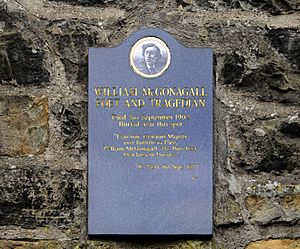
Dundee, the city where McGonagall lived for a long time, has several things to remember him by:
- The William Topaz McGonagall Appreciation Society held a special dinner in 1997. The food was served in reverse order, starting with coffee and ending with appetizers!
- Since 2004, the Dundee Science Centre has hosted an annual Charity McGonagall Gala Dinner. Guests eat their meal backward, from dessert to starter.
- There is a place called McGonagall Square in the West End of Dundee.
- Some of his poems are carved into the pavement along the River Tay in Dundee. One of these carvings even has a spelling mistake, reading "Beatiful railway bridge of the silv'ry Tay."
- Dundee Central Library has a special collection of his works.
He is buried in an unmarked grave in Greyfriars Kirkyard, Edinburgh. From around 1950 to 1995, a memorial bench stood near the church. It had a funny inscription, typical of McGonagall: "Feeling tired and need a seat? Sit down here, and rest your feet." The bench eventually broke and was not replaced.
His Poems
McGonagall's friends helped publish his poems in a series of books, usually titled Poetic Gems. Today, you can find all his poems together in one book called The Complete McGonagall. It doesn't matter when a poem was written; they appear in different Poetic Gems books. For example, "Address to the Rev. George Gilfillan" was one of his first poems, but it's in More Poetic Gems.
See also
 In Spanish: William McGonagall para niños
In Spanish: William McGonagall para niños
- Romeo Coates
- Florence Foster Jenkins
- James McIntyre (poet)
- Amanda McKittrick Ros
- Julia A. Moore
- Wesley Willis
- Tommy Wiseau
- Scottish literature
- The Eye of Argon
- Poetaster
 | Delilah Pierce |
 | Gordon Parks |
 | Augusta Savage |
 | Charles Ethan Porter |


